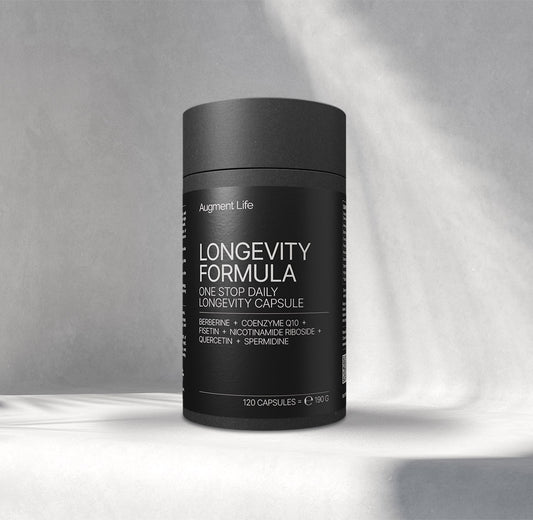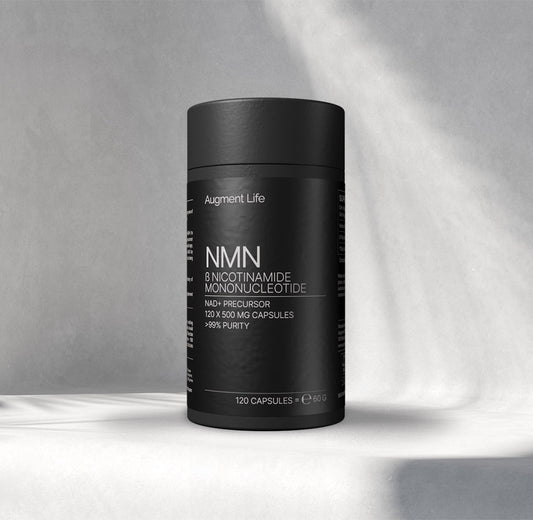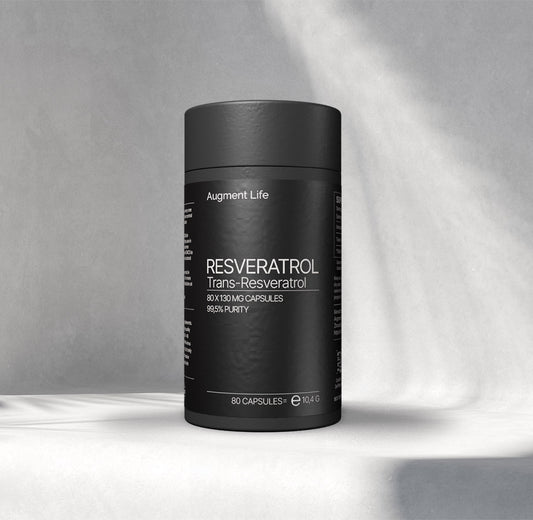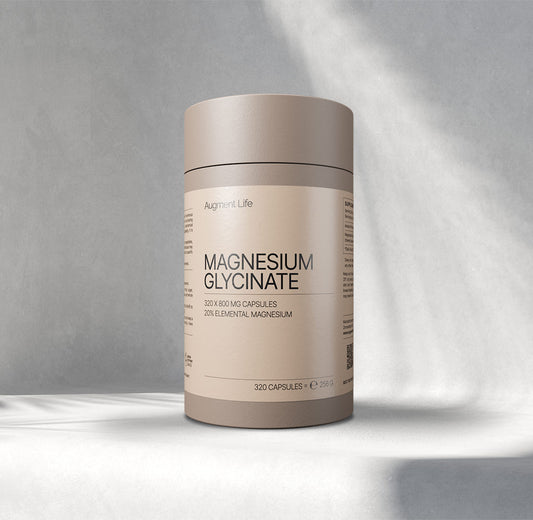NMN or nicotinamide mononucleotide is a molecule naturally present in our bodies that is used for the synthesis of NAD (nicotinamide adenine dinucleotide). NAD is used in many metabolic processes, such as in mitochondria for energy production or in the nucleus for DNA repair. Other than that, NAD is important for proper gene synthesis and stress responses.
When there is a lack of NMN as a raw ingredient for NAD synthesis, there also won’t be enough NAD produced for further metabolic functions. It is a sort of cascade where the concentration of NMN is a limiting first step. Therefore, lower levels of NMN can cause metabolic disbalance and problems, especially with regular cell functioning and DNA repair. However, usual oral NAD supplementation wouldn’t work because it cannot enter the cell through its membrane. On the other side, cells do possess a specific carrier protein for NMN that successfully transports it inside the cell where it can perform its role.
That’s why some scientists support the idea that NMN supplementation can prevent DNA damage and prolong cell life through sequential NAD production (1). Since we also naturally produce less NMN as we age, NMN supplementation could potentially be used to prevent cell aging and all related processes. A lot of research on NMN has already been conducted, and many benefits of NMN supplementation were discovered.
Benefits of NMN Supplementation
A lot of research on NMN was conducted on animal models, mainly mice. These have immediately shown many benefits that additional intake of NMN had on mice, such as:
- enhanced physical activity and improved mitochondrial metabolism (2),
- improved sensitivity to insulin in diabetic and obese mice and lowered age-related fat tissue inflammation (3).
- slowed damage in mouse Alzheimer’s disease models (4),
- stably protected blood-brain barrier (5).
Even though mice models are closely related and designed to be very similar to human organisms, studies of NMN supplementation on humans are more important to show actual effects. Early research conducted through clinical studies on human subjects already looks promising and shows:
- increased levels of NAD circulating in blood (6),
- increased aerobic capacity during training in amateur runners (7),
- reduced drowsiness and muscle responsiveness in older participants (8).
It’s worth mentioning NMN is present in food, but in much lower doses than one can daily take through supplements. You can find NMN in (2):
- broccoli - 0.25 to 1.12 mg per 100 grams,
- avocado - 0.36 to 1.60 mg per 100 grams,
- raw beef - 0.06 to 0.42 mg per 100 grams,
- cabbage - up to 0.9 mg per 100 grams.
- shrimp - 0.22 mg per 100 grams,
- edamame - 0.47 to 1.88 mg per 100 grams,
- cucumber peel - 0.66 mg per 100 grams,
- mushroom - 0 to 1.01 mg per 100 grams,
- tomato - 0.26 to 0.30 mg per 100 grams.
NMN Supplements - Dosage
Given that research on NMN supplementation on human subjects is scarce, but still ongoing, the exact dose that one should take is still undefined. However, it is important to note NMN supplementation through oral intake has been declared safe, with rare side effects.
The study conducted on amateur runners, mentioned above, tested a daily intake up to 1200 mg of NMN and found it completely safe, with no side effects. Doses lower than 1200 mg also did not provoke any ill responses. All studies conducted on mice found NMN is well tolerated as well, where the doses even went up to 300 mg of NMN per kg of body weight. With that said, it is also important to note that doses of 1200 mg had greater beneficial effects on humans than doses of 600 mg, in the clinical study done on amateur runners. That means one could benefit more from taking more NMN, while it’s still safe and well tolerable (7). Depending on how the supplement is formulated, that could even be a couple of pills of NMN a day.
NMN - Metabolism
Mouse studies also found NMN is quickly absorbed in the gut wall and perfectly water soluble.It starts circulating in blood already after a couple of minutes after administration. After 15 min, all of the administered amounts were completely absorbed in the gut (3). That means there are no complicated processes of NMN uptake by the body, and it can be quickly metabolized, performing its functional roles.
After NMN is absorbed by the cells from blood, it is quickly converted to NAD+, and excess amounts are stored in liver, cortex and skeletal muscle. The increase in liver deposits could be detected as a spike after 30 min of administration, and even after 6 months, as tested and shown in mouse models (2).
Literature:
1. Shade C. The Science Behind NMN-A Stable, Reliable NAD+Activator and Anti-Aging Molecule. Integr Med (Encinitas). 2020 Feb;19(1):12-14. PMID: 32549859; PMCID: PMC7238909.
2. Mills KF, Yoshida S, Stein LR, Grozio A, Kubota S, Sasaki Y, Redpath P, Migaud ME, Apte RS, Uchida K, Yoshino J, Imai SI. Long-Term Administration of Nicotinamide Mononucleotide Mitigates Age-Associated Physiological Decline in Mice. Cell Metab. 2016 Dec 13;24(6):795-806. doi: 10.1016/j.cmet.2016.09.013. Epub 2016 Oct 27. PMID: 28068222; PMCID: PMC5668137.
3. Caton PW, Kieswich J, Yaqoob MM, Holness MJ, Sugden MC. Nicotinamide mononucleotide protects against pro-inflammatory cytokine-mediated impairment of mouse islet function. Diabetologia. 2011 Dec;54(12):3083-92. doi: 10.1007/s00125-011-2288-0. Epub 2011 Sep 8. PMID: 21901281.
4. Wang X, Hu X, Yang Y, Takata T, Sakurai T. Nicotinamide mononucleotide protects against β-amyloid oligomer-induced cognitive impairment and neuronal death. Brain Res. 2016 Jul 15;1643:1-9. doi: 10.1016/j.brainres.2016.04.060. Epub 2016 Apr 26. PMID: 27130898.
5. Wei CC, Kong YY, Hua X, Li GQ, Zheng SL, Cheng MH, Wang P, Miao CY. NAD replenishment with nicotinamide mononucleotide protects blood-brain barrier integrity and attenuates delayed tissue plasminogen activator-induced haemorrhagic transformation after cerebral ischaemia. Br J Pharmacol. 2017 Nov;174(21):3823-3836. doi: 10.1111/bph.13979. Epub 2017 Sep 6. PMID: 28812311; PMCID: PMC5647191.
6. Okabe K, Yaku K, Uchida Y, Fukamizu Y, Sato T, Sakurai T, Tobe K, Nakagawa T. Oral Administration of Nicotinamide Mononucleotide Is Safe and Efficiently Increases Blood Nicotinamide Adenine Dinucleotide Levels in Healthy Subjects. Front Nutr. 2022 Apr 11;9:868640. doi: 10.3389/fnut.2022.868640. PMID: 35479740; PMCID: PMC9036060.
7. Liao B, Zhao Y, Wang D, Zhang X, Hao X, Hu M. Nicotinamide mononucleotide supplementation enhances aerobic capacity in amateur runners: a randomized, double-blind study. J Int Soc Sports Nutr. 2021 Jul 8;18(1):54. doi: 10.1186/s12970-021-00442-4. PMID: 34238308; PMCID: PMC8265078.
8. Kim M, Seol J, Sato T, Fukamizu Y, Sakurai T, Okura T. Effect of 12-Week Intake of Nicotinamide Mononucleotide on Sleep Quality, Fatigue, and Physical Performance in Older Japanese Adults: A Randomized, Double-Blind Placebo-Controlled Study. Nutrients. 2022 Feb 11;14(4):755. doi: 10.3390/nu14040755. PMID: 35215405; PMCID: PMC8877443.












2 comments
Hola Katherin!
El NMN debería venir con una cuchara dosificadora para 500 MG
Sin embargo, no recomendamos ninguna dosis específica de NMN. Sí aconsejamos empezar con una cantidad baja 250 MG o menos muchas personas quieren tomar 500 o incluso 1 g.
Muchos de nuestros clientes quieren implementar un protocolo como David Sinclair que dice que toma 1 g al día nosotros no sugerimos empezar con 1 g al día. Debido a que NMN no es un suplemento aprobado por la EFSA no hay una recomendación estándar.
Póngase en contacto con nosotros en info@augmentlifeshop.com si desea más información!
Les compré en NMN peor no dice en ningún lado la cantidad diaria que debo tomar . Si una cucharada o una cucharadita